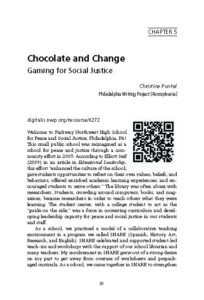Author: Christina Puntel
Summary: In this sample chapter from Assessing Students’ Digital Writing: Protocols for Looking Closely, a teacher-consultant shares insights from the collegial feedback she received on a student-led food justice project and the implications for her instruction and assessment. For teachers whose students engage in complex projects, this offers a model of how teachers used the Descriptive Review process to produce a more in-depth and valid assessment of student work than any traditional rubric could provide.
Original Date of Publication: June 30, 2015

Download “Chocolate and Change: Gaming for Social Justice,” from Assessing Students’ Digital Writing
Excerpt
Reflecting on the process, I realize no rubric could have captured the many angles through which my colleagues and I looked at the game Brandon and Tre created. As I encourage these students and the others I teach in Multicultural Ethical Issues classes or in my own Spanish classes, I continue to value the stance the Descriptive Review Process affords me. Whether I gather with teachers to look at student work in person or online, the power of oral inquiry gives me insight into the student’s strengths as well as ideas for further works, different methods, and expanding my role as teacher and learner. During this process, I was also introduced to the Multimodal Assessment Project from NWP (MAP, 2013). When students compose digitally in my classroom, sometimes I have a hard time encouraging next steps and revision in the works they create. This framework gives me some tools to help scaffold those processes, while still valuing student choice. I am particularly excited about two of the domains, “substance” and “process management and technical skills,” in this framework as I plan further projects and themes.
Related Resources
- No Longer a Luxury: Digital Literacy Can’t Wait
- Students as Writers and Composers: Workshopping in the Digital Age
- Teaching in a Movement for Justice
Original Source: National Writing Project, http://www.nwp.org/cs/public/print/resource/4415